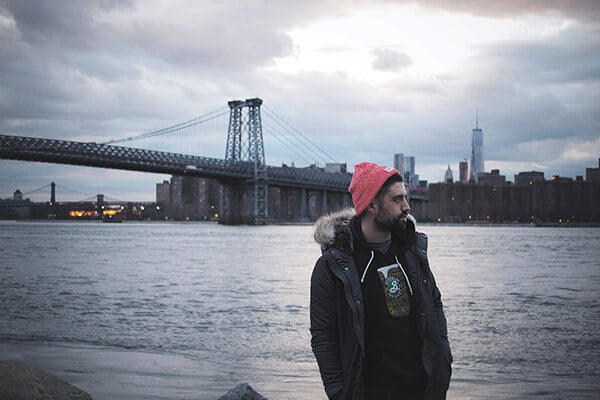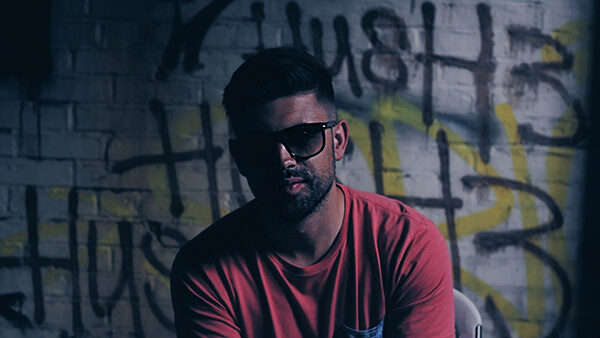We recently had the pleasure of sitting down with John Whoriskey Jr., an up-and-coming vocalist, beats wizard, writer, producer, and videographer. His prismatic skill set has led to a series of compelling works, recently expanding from home-studio recording to music videos for existing tracks and developing his brand, Bright EYED. A Massachusetts native, Whoriskey Jr. released his debut full-length See You Soon this summer, which is available now on iTunes and streaming via Soulspazm Digital.
https://youtu.be/qJJqYBDBngQ
PERFORMER: You just released a sweet new album. Let’s start with that.
JOHN: I’ve been working on See You Soon for a long time. From the first word of the first song spontaneously combusting somewhere in my brainwaves to the clock hitting 12:00.01 am on June 15th, the direction of the project changed 100 times. As with every piece of art, there were definitely a lot of ups and downs. The original idea was actually to release it as a mixtape. After all of the ins and outs were fine-tuned with my distributor, Soulspazm Digital. See You Soon was an album: a 10-song full length project that I basically, with the exception of my mixing/mastering engineer & some production help on “bridges, i,” wrote, produced, and recorded all on my own.
PERFORMER: If you had to name the one, indispensable tool used in-process, what would that be?
JOHN: Right now my Native Instruments Maschine MK2 is probably the greatest musical investment I’ve ever made. I pretty much produced my entire album with it. Just about every single time I break it out I learn something new. Whether it’s something new about the Maschine itself or a completely different way to write and compose music, it’s truly helped change my style as a musician.
PERFORMER: You put out some other recordings previously. What has your experience in self-production been, moving up to See You Soon?
JOHN: So I released 2 mixtapes Going Back to College [in] 2012, Single Ladies, 2013, and an EP I Should Have Been a Rapper, 2013 – [dropped] 3 bodies of music in 12 months – before I put out See You Soon earlier this summer. I was really just starting to get my feet wet before this album. My own personal production was much simpler. The other producers that I had been working with were a lot better than what I was doing at the time. That was inspiring in itself. I’m still proud of the music I was making before the album, but I honestly feel like I’m finally at a level where what I’m making is quality, different, and real.
PERFORMER: Well agreed. What are some of the projects you drew inspiration from early on?
JOHN: I’ve drawn influence from a variety of genres. I pretty much listen to everything from mainstream to undiscovered, deep-internet artists. I think having a wide ear for music has helped me find a good balance of emotion and wide range of genre to my work. There are too many specific artists and producers to really touch on any few in particular. My style kind of has a splash of a lot of things.
PERFORMER: How about moving back and forth between Boston and New York? Has that affected your music?
JOHN: My brain functions better creatively with all of the moving around. It’s kind of an environmental luxury that I’ve created for myself and it’s extremely refreshing. Being able to split time between two of the greatest cities in the world – my home and second home – creating my own art freely and experiencing the world around me, allows me to understand, be self-aware and tell my own story. It’s like my life and story is heavily influenced by this Boston/NYC balance, and it easily translates into the music. The age old cliché “write what you know.”
PERFORMER: Certainly, and the music really lets the listener know what’s going on in your head – or at least creates that effect. The album has a distinct narrative feel to us.
JOHN: People seemed to really relate to some of the most personal and raw thoughts that I had expressed in my previous projects. On top of trying to build on that, as an artist, I’m still really in love with the album and telling a complete story. There were themes that I tried to map out before I got too deep into the project that actually helped me find a concrete direction for it. I spent a lot of time on the specific order of the songs too. That’s really important to me.

PERFORMER: Ok so sequencing was a core focus. On top of that cadence we’re hearing some pretty daring vocalization on this record, and lots of wordplay. What constitutes strong lyrical content in your eyes?
JOHN: Wow thank you, you know I really appreciate that man. Personally, I feel like it all comes down to honesty. I’ve never been afraid to open up – even when sometimes in the long run some of those genuine words have sort of had the opposite effect I was hoping for [or] driven those exact people I thought it would bring closer away from me. After I dropped I Should Have Been a Rapper people actually told me I should have been more specific and express my feelings further. Of course, I took that to heart. I truly thought I had already done that. But those same people gave me that stamp of approval after this one. I feel like being so truthful has helped me execute effectively too. Being honest with and about myself makes it easier for the listener to relate to the art.
PERFORMER: Definitely. The listener can lock onto a story within the lyric text, and we find a clear theme, but each track has a distinct sound. Is there a particular song or group of tracks that you feel best represents the record?
JOHN: There’re two songs that really shaped this project. While I was writing “bridges, i” I really think I found my voice and most of the core of the underlying themes. “Running” is where I found my style as a producer.
PERFORMER: Along those lines, let’s talk beat construction. What is your process for that?
JOHN: Once I have the beat in a good place – sometimes I’ll go back and tweak the bass/drum patterns/transitions, etc. After, I’ll lay down my scratch, add some wetness, make it nice, and then I’ll listen to it like 40 times in the car or on my computer. From there, I figure out where I need to improve. Sometimes I’ll show rough passes to a few, a very small circle of close friends, to get some feedback. Then I go back and really iron it out, lay in some adlibs/harmonies, clean up the last minute changes to the beat and get it over to my mixing/mastering engineer – Steve “Rockstar” Dickey – where he helps make me sound like me.

PERFORMER: When you sit down to write, what comes first? Are there any critical motivating conditions to get rolling, or is it more spontaneous?
JOHN: Every song has like a thousand percent different writing process than the others. I actually have trouble sitting myself down cold and saying, “I’m going to write this new song right now.” For better or for worse that just doesn’t work for me. It’s kind of like when I get to a point where I realize I’ve been living and I have some new life stuff I can and need to talk about, the idea starts to pour out of me. I’ve written songs over the course of days/months/a year and then I’ve written songs that take like twenty-five minutes. It really just depends where I’m at mentally with the content.
PERFORMER: You present some darker themes, in certain tracks, but not without a sense of humor.
JOHN: I love wordplay and one-liners. I think that’s one of the parts of the hip-hop genre that I really enjoy… It makes the music fun [to create] and fun to listen to. Listeners really tend to love funny/amazing punch lines. It’s almost like a challenge in itself to come up with lines that deliver hard. My first single, “Running” is kind of one big run on metaphor:
Made an imprint think that I could go the distance
I’ve been running laps while everybody else stretching
The truth in these lies
We need proof when we die
If we do live our lives
Right well see lights in the sky
PERFORMER: We think it’s worth seeing on the page and then listening to it; the listener can identify the terminal rhyme, but with a closer look, the internal is impressive. It isn’t easy to make that all breathe properly. Stepping back a bit, what do you feel is working for the Rap/Hip-Hop genre right now? What could we do without?
JOHN: You know, I think the genre is at a really good place right now, at the radio/major level. I’m kind of an outsider in some regards. I’ve had some real industry people tell me “You don’t have a specific style or genre.” I expected that, and that’s truthfully what I was hoping to hear. It’s all in the plan. In the present world where many people have the attention span of like 5 seconds, I feel like you can’t tell people the entire story in one breath. You have to introduce your characters and the storyline first. Then you can get into all the details. I wanted to show my versatility on this album, so if I were to say the genre is lacking anything at the moment it’s that: an abundance of artists with versatility. That’s all changing and I think people know they need to be that way in order to survive and/or be something different. I’m not saying right now that I’m here trying to “change the game.” That’s a tall task and I don’t have that much of an ego. However, I can honestly say and fully believe that what I’m making and doing is different. The music business itself is in a tough place at the moment across the board. I think that will all get sorted out in the long run as we continue into this crazy world of endless streaming. But that’s another subject.
PERFORMER: There’s no denying that the industry has changed. Do you think that streaming-driven consumption has helped to open the door for self-promoting musicians?
JOHN: Yes and no. Ten years ago if you were able to get your single or album on iTunes, you could actually sell a lot of units, just by being there alone. There are a lot of opportunities now for people who are able to make a break through to really make a name for themselves. Actually, getting to that point is the hardest part – especially in a highly diluted market.
PERFORMER: What comes next?
JOHN: I mentioned earlier the music that didn’t make the album. [I] of course have plans of getting that into people’s ears. Aside from a couple of non-music related independent short film acting projects I’m involved with, I’m working on pushing the album, playing a couple shows and focusing on building the Bright EYED brand. I’m also kind of always making new music so my next project (which I may or may not have hinted at the name of into somewhere on See You Soon) is kind of already in the works. I really hoped to display a wide range of style with this first album so that I could introduce what I’m capable of. The next project is going to be a lot more honed.
PERFORMER: Well now we’ll have to find that. Any hints?
JOHN: All I’m going to say is if you’re sleeping on “Bring Me Up,” you probably don’t even have a chance at a guess.
Follow on Twitter @JohnWhoriskeyJr
All photos courtesy of Ben Stoll [IG: @bennybstoll]
